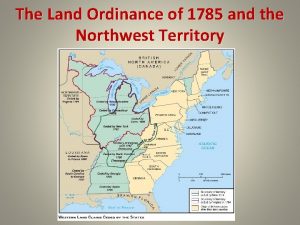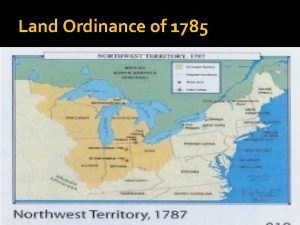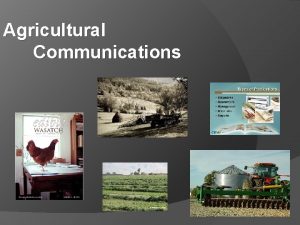The History of Agricultural Communication Agricultural Societies 1785





















- Slides: 21

The History of Agricultural Communication

Agricultural Societies � 1785 – Created Philadelphia Society for Promoting Agriculture ◦ ◦ ◦ First agricultural society to publish results of experimental work Members included George Washington, Thomas Jefferson, & Benjamin Franklin Allowed access to libraries • 1790 - Began publishing own information ◦ ◦ Practical farming information Crop practices

Agricultural Societies �End of 18 th century readers and writers were large planters �Preached to the choir �Started agricultural fairs

Agricultural Fairs �Promoted exchanges in information ◦ 1809 - Columbia Agricultural Society near Washington D. C. ◦ 1811 - Berkshire County Ag Fair in Pittsfield, MA �Good at reaching“dirt farmers” �Disliked“book farming” �Wanted to see innovations and talk about them

Farm Journals Grow � 1790 s - societies published farming publications ◦ Frustration with popular press �Editors lacked agriculture knowledge & scientific understanding of agriculture �Editors weren’t journalists �Publications short lived �Early agriculture journals ◦ Plough Boy ◦ New England Farmer ◦ The Country Gentleman

Farm Journals Grow � 1840 s -1850 s – Agriculture publications grew away from societies � 1840 s-1850 s – scientists at colleges of agriculture writing for farm journals � 1842 – American Agriculturist ◦ Editors: A. B. and R. L. Allen ◦ Oldest farm magazine still published under same name � 1850 – Most major newspapers have employed agricultural editors or writers ◦ Journalists changed their level of expertise, understanding the research that scientists were conducting

Changes in Agricultural Communication �Journals changed their sources, relying on scientists instead of farmers ◦ Infused college science �Journalists changed their conception of the audience they were serving More family-based � 1862 - Justin Morrill’s Federal Land. Grant Act ◦ Educate children of farmers and mechanics �Specialize in those areas

Agricultural Communication Eras � 1880– 1920: Upward & Westward � 1920– 1940: Period of Stagnancy � 1940– 1975: Bonanza Era

1880– 1920: Upward & Westward �Marked by a rapid increase of farm journals �Number of farm journals increased �Circulation numbers rise in the early 1900 s ◦ In 1880, one in four farmers received a farm periodical, by 1920, the average farm household received two to three periodicals

1880– 1920: Upward & Westward Shift in farm journals ◦ Addressed family issues ◦ More objective journalism ◦ Printing advances allowed for illustrations Cartoons Peter Tumbledown in Farm Journal Reckless Robert in New England Homestead Lazy Farmer in Prairie Farmer

1880– 1920: Upward & Westward �Reasons for the rapid increase: ◦ Industrial revolution ◦ 1887 – Hatch Act to establish agricultural experiment stations ◦ 1890 – 2 nd Morrill Act �Make college open to public or offer second institution for black students ◦ 1905 – First ag journalism course taught at Iowa State University ◦ 1914 – Smith-Lever Act to establish cooperative extension services

1880– 1920: Upward & Westward �Reasons for the rapid increase: ◦ Ag college enrollment increased ◦ USDA �Published Farmers’ Bulletins & Yearbook of Agriculture ◦ Land opened in Midwest and West ◦ Less critical of “book farming” ◦ More sources available

1920– 1940: Period of Stagnancy �In 1920 s, editors changed roles from subject matter authorities untrained to information movers who were trained �Farm periodicals were fighting to stay alive ◦ Subscription rates low ◦ Published less frequently ◦ Free, controlled circulation

1920– 1940: Period of Stagnancy �Beginning in 1920 s, what communication channel became a major force to deliver agricultural news? �Radio (6 out of 10 farmers owned radios) �Radio has positive effect on rural lives ◦ Believed it would keep youth on farm ◦ Operated with batteries ◦ Provided entertainment & information more quickly

1920– 1940: Period of Stagnancy �Reasons for the stagnancy of farm publications: ◦ Income declined ◦ Popular magazines began to be read more than farm publications ◦ 1920 - Movie houses become common in rural areas ◦ High demand for automobiles, transportation, building, and road construction

1920– 1940: Period of Stagnancy �Reasons for the stagnancy of farm publications: ◦ Depression effected the economy �Agriculture, mining, and shipping suffered �Farmers overexerted �Land prices plummeted 30 -40% �Input prices increased � 1930 Dust Bowl

1940– 1975: Bonanza Era �Farm publications made a comeback by 1950 s through circulation & advertising ◦ General advertising fading ◦ House organs (company magazines) grow �Told own story �Advertising tripled from $9 M in 1940 to $33 M in 1953 �In 1970 s, prosperity meant seven publications per farmer

1940– 1975: Bonanza Era �Reasons for the increase in farm publications: ◦ Due to post-war efforts, farm output increased ◦ Rapid gain in formal education �Farmers were more educated ◦ Economy rebounded from depression �Farm income tripled

1940– 1975: Bonanza Era �Reasons for the increase in farm publications: ◦ Prosperity ◦ Improved information from universities ◦ More researchers/Extension ◦ More publications

Famous Ag Communicators… �Edwin T. Meredith ◦ Secretary of Agriculture ◦ Successful Farming magazine started in 1902 ◦ Better Homes & Gardens magazine (started as Fruit, Gardens, and Home in 1922) �Henry C. Wallace ◦ Wallace’s Farmer �IA state agricultural magazine ◦ Secretary of Agriculture 1921 -1923

Famous Ag Communicators… �Henry A. Wallace ◦ VP of United States in 1941 -1945 ◦ Secretary of Agriculture in 1933 ◦ Founded Hi-Bred Corn= Pioneer Hi-Bred �Everett Mitchell ◦ 44 years in broadcast ◦ Hosted National Farm & Home Hour on NBC �Livestock reports & entertainment
 The romantic period 1785 to 1832
The romantic period 1785 to 1832 Land ordinance of 1785
Land ordinance of 1785 Nato a milano 1785
Nato a milano 1785 Milano 1785
Milano 1785 1785 periodo storico
1785 periodo storico Milano 1785
Milano 1785 Siya ang hari ng espanya sa panahon ni jose basco
Siya ang hari ng espanya sa panahon ni jose basco History help us understand people and societies
History help us understand people and societies Dystopian society examples in real life
Dystopian society examples in real life Hình ảnh bộ gõ cơ thể búng tay
Hình ảnh bộ gõ cơ thể búng tay Frameset trong html5
Frameset trong html5 Bổ thể
Bổ thể Tỉ lệ cơ thể trẻ em
Tỉ lệ cơ thể trẻ em Gấu đi như thế nào
Gấu đi như thế nào Thang điểm glasgow
Thang điểm glasgow Chúa sống lại
Chúa sống lại Môn thể thao bắt đầu bằng chữ f
Môn thể thao bắt đầu bằng chữ f Thế nào là hệ số cao nhất
Thế nào là hệ số cao nhất Các châu lục và đại dương trên thế giới
Các châu lục và đại dương trên thế giới Công thức tính độ biến thiên đông lượng
Công thức tính độ biến thiên đông lượng Trời xanh đây là của chúng ta thể thơ
Trời xanh đây là của chúng ta thể thơ Mật thư anh em như thể tay chân
Mật thư anh em như thể tay chân







































